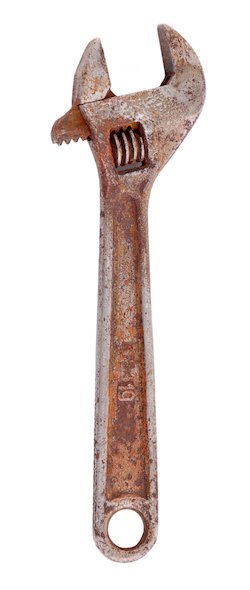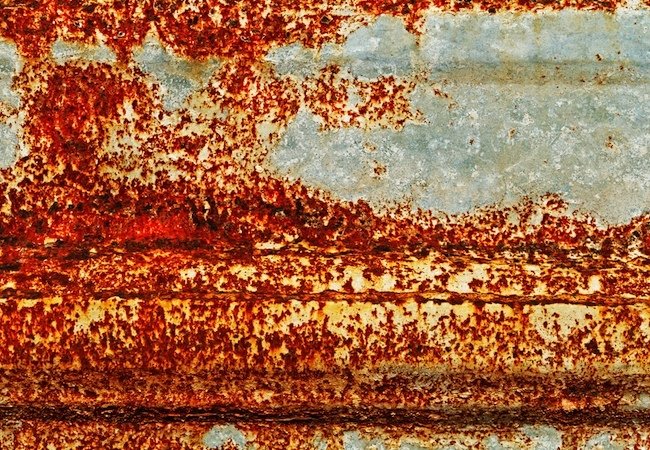We may earn revenue from the products available on this page and participate in affiliate programs. Learn More ›
Learning how to remove rust from metal isn’t rocket science, and in homeowners’ ongoing fight to maintain outdoor tools and patio furniture, rust removal is an essential skill. There are at least three ways to get the job done; choose the method you like best from the options detailed below. Bear in mind that no matter the technique used, any effort to remove rust begins the same way: by using pliers, screwdrivers, or wrenches—and, if necessary, lubricant—to remove all fasteners (for example, screws).
Rust Converter Method
MATERIALS AND TOOLS
– Wire brush
– Paintbrush
– Liquid or spray rust converter

Available for purchase in liquid or spray forms at most home improvement centers, rust converters work wonders on iron or steel. Handling the product is a cinch. First, use a wire brush to scrape off any rust dust or flaking paint on the item you wish to clean. Next, apply the rust converter with a paintbrush (if you’ve chosen the liquid) or directly (if you’ve opted for the spray). What happens next is a miracle of chemistry: The rust transforms into a black substance, one that prevents further corrosion and can be painted over to achieve a finish that seems brand-new.
Elbow Grease Method
MATERIALS AND TOOLS
– Coarse-grit sandpaper
– Fine sandpaper
– Steel wool
– Electric drill with wire wheel
If you want to remove rust from metal marred not only by corrosion but also a great deal of flaking paint, there’s really no substitute for good old-fashioned elbow grease. Sanding the surface of the object with sandpaper or steel wool (or even a scouring pad) usually does the trick, so long as the rust is light. Just remember to scrape first with a coarse-grit paper, making sure you remove all pockmarks before finishing with a finer grit to smooth out grooves. For heavier rust buildup, try an electric drill outfitted with a wire brush. Alternatively, if you have access to one, use a grinder, but do this carefully. Keep the grinding wheel, stripping disc, or flap disc moving on the object at all times, or you’ll risk causing damage worse than rust!
Chemical Rust Remover Method
MATERIALS AND TOOLS
– Goggles
– Rubber gloves
– Long sleeves
– Pants
– Paintbrush
– Putty knife
– Rags
– Chemical removers
Take tremendous care when using commercially sold chemical rust removers; these powerful solutions contain either hydrochloric or phosphoric acid. Do this type of work only in well-ventilated spaces, and be sure to wear protective eyewear, rubber gloves, and full-coverage clothing.
Want to remove rust from a small metal object? You can fully immerse it in the rust remover, letting it soak one to three hours for light rust, overnight for heavy rust. If you are removing rust from a larger, more unwieldy object, consider using a remover in gel form. Once applied, different products take different amounts of time to be effective, so read the manufacturer’s directions closely. In cases where a significant amount of rust has built up over time, be prepared to apply several courses of the chemical before seeing the desired results.
To learn more about removing rust, check out our video below.


